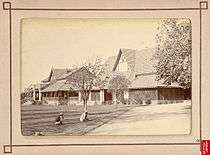Gymkhana

Gymkhana (Hindi: जिमख़ाना, Assamese: জিমখানা, Bengali: জিমখানা, Urdu: جِمخانہ, Sindhi: جمخانه) is an Indian term which originally referred to a place of assembly. The meaning then altered to denote a place where skill-based contests were held. "Gymkhana" is an Anglo-Indian expression, which is derived from the Persian word "Jamat-khana".[1] Most gymkhanas have a Gymkhana Club associated with them, a term coined during British Raj for gentlemen's club.
In India, the term gymkhana is commonly used to refer to a gymnasium. More generally, gymkhana refers to a social and sporting club in the Indian subcontinent, and in other Asian countries including Malaysia, Thailand, Burma and Singapore, as well as in East Africa.
In English-speaking countries outside the Indian subcontinent, a gymkhana is a multi-game equestrian competition held to display the training and talents of horses and their riders, particularly in speed events.
The term is also used as the name of a timed automotive obstacle course, see Gymkhana (motorsport) and Gymkhana (motorcycle).
Etymology

The first element of Gymkhana comes from gend meaning ball in Hindi/Hindustani/Khariboli. This element is distinct from English word gym, short for gymnasium and gymnastics which has Greek and Latin roots.[2] The second element, khānā (ख़ाना) has Indo-Persian or Indo-Arabic origin meaning a place or a compartment. In the Persian (خانه) it's a term for dwelling, house.[3]
See also
References
- ↑ MacMillan, Michael (1895). The Globe Trotter in India Two Hundred Years Ago: And Other Indian Studies. p. 91.
- ↑ Oxford Dictionaries Gymnasium etymology
- ↑ From Loghat'nāmeh-ye Dehkhoda, Third Edition (Tehran University Press, 2006), quoted from Borhān-e Ghāte' by Dr Mohammad Moin.
External links

- "Gymkhana". New International Encyclopedia. 1905.
- "Gymkhana". Encyclopædia Britannica (11th ed.). 1911.